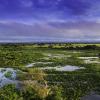Climate & Environment
 The new mammal lived in Colorado 70 to 75 million years ago—a time when a vast inland sea covered large portions of the state, and animals like sharks, turtles and giant crocodiles abounded.
The new mammal lived in Colorado 70 to 75 million years ago—a time when a vast inland sea covered large portions of the state, and animals like sharks, turtles and giant crocodiles abounded. Microorganisms growing in landfills, on agricultural land and in wetlands are contributing to skyrocketing levels of atmospheric methane, a potent greenhouse gas, according to new CU Boulder research.
Microorganisms growing in landfills, on agricultural land and in wetlands are contributing to skyrocketing levels of atmospheric methane, a potent greenhouse gas, according to new CU Boulder research. A College of Media, Communication and Information expert’s book has won a trio of awards for its attempt to change how we think about, and tell the story of, plastics pollution. Read up on Phaedra Pezzullo’s latest.
A College of Media, Communication and Information expert’s book has won a trio of awards for its attempt to change how we think about, and tell the story of, plastics pollution. Read up on Phaedra Pezzullo’s latest. In parts of the Rocky Mountains, these small, plump birds co-exist with a closely related species. To better distinguish their own kind from their cousins, they evolved a distinct song.
In parts of the Rocky Mountains, these small, plump birds co-exist with a closely related species. To better distinguish their own kind from their cousins, they evolved a distinct song. Albert Kettner explains that catastrophic flooding has become more common in the 21st century. The reasons behind this shift are complex—involving climate change, urban infrastructure and human impacts.
Albert Kettner explains that catastrophic flooding has become more common in the 21st century. The reasons behind this shift are complex—involving climate change, urban infrastructure and human impacts. An interdisciplinary team transforms complex research into an interactive museum exhibit on how ice sheets influenced weather millennia ago.
An interdisciplinary team transforms complex research into an interactive museum exhibit on how ice sheets influenced weather millennia ago. CU Boulder researcher Pedro DiNezio emphasizes solving the problems of climate change in the here and now.
CU Boulder researcher Pedro DiNezio emphasizes solving the problems of climate change in the here and now. A risk communication researcher at CU Boulder sheds light on what motivates people to stay put when natural disasters like hurricanes Helene and Milton threaten.
A risk communication researcher at CU Boulder sheds light on what motivates people to stay put when natural disasters like hurricanes Helene and Milton threaten. A CU Boulder tribal advisor discuss how Western science can work with Indigenous people to improve relationships, understanding, and research across cultures.
A CU Boulder tribal advisor discuss how Western science can work with Indigenous people to improve relationships, understanding, and research across cultures. Climate change from greenhouse gas emissions could make extreme El Niño events more frequent, according to new research co-led by CU Boulder.
Climate change from greenhouse gas emissions could make extreme El Niño events more frequent, according to new research co-led by CU Boulder.


